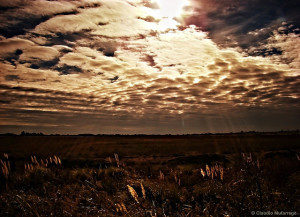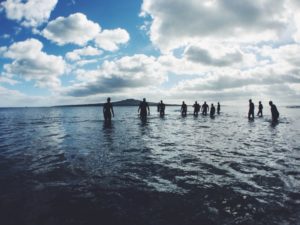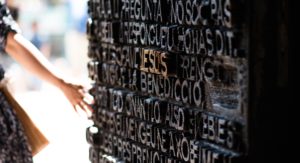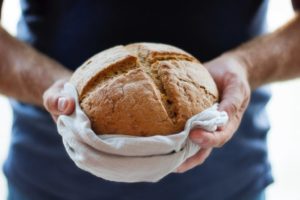
People go through a cycle of bolting themselves from one shakeable and unreliable object to another for security, never finding rest for their souls. But not so for us, because – through Jesus Christ – we have been bolted to God Himself in the new covenant. The only immovable things in this world are the promises of God made real to us through Jesus Christ.
If you had to fill out a survey on a scale of 1-10, how secure do you feel right now? What makes you feel secure? We all have things to happen that disrupt our security – personal things, financial things, health issues, family turmoil. How does one find security in an extremely insecure world?
With this in mind, we turn to Genesis 9:8-17. Noah and his family have disembarked the ark, and God has begun to communicate with them and make His covenant with Noah.
Then God said to Noah and to his sons with him, “Behold, I establish my covenant with you and your offspring after you, and with every living creature that is with you … never again shall there be a flood to destroy the earth.”
– vv. 8-11
This would have been a very important covenant for Noah and his family. What questions would be in your mind if you had just survived a worldwide, catastrophic flood? Do you need to live in the ark in case there’s another flood? Do you need to upkeep the ark and make sure it’s stocked? God says, “No, I will never flood the earth like this again.”
God’s Covenant with Noah
What we learn about God in these verses is that He relates to His people through covenants. A covenant is a binding of two parties together with promises. That’s how God relates to His people, then and still. He binds Himself to His people with promises.
When you were a child and you knew that your parents were committed to you, it made you feel secure. In marriage, spouses can feel secure when their commitment to each other is solid. Commitment begets security. And it’s the same for us as God’s people. Our security comes in the fact that God has bound Himself to us with promises, just like He bound Himself to Noah and the earth.
Now, think again how important this would have been to Noah. When a storm cloud appeared on the horizon or a drizzle began, it must have been tempting to be terrified. How could Noah feel secure when a storm came up? His security could have only come from faith in God’s covenant faithfulness.
God’s Covenant with Us
We are in what the Bible calls the “new covenant.” In Jeremiah 31:31-34, God points ahead and says He will make a new covenant unlike any other:
“Behold, the days are coming, declares the Lord, when I will make a new covenant with the house of Israel and the house of Judah, not like the covenant that I made with their fathers … I will forgive their iniquity, and I will remember their sin no more.”
So, here’s this glimpse at the covenant to come. And this is absolutely central to our sense of security as people in a fallen world. All the other promises of God are believable because this covenant is believable.
People go through a cycle of bolting themselves from one shakeable and unreliable object to another for security, never finding rest for their souls. But not so for us, because – through Jesus Christ – we have been bolted to God Himself in the new covenant. The only immovable things in this world are the promises of God made real to us through Jesus Christ.
The Signs of God’s Covenants
Back in Genesis, we see God make a covenant and then a visual aid to go along with it:
And God said, “This is the sign of the covenant that I make between me and you and every living creature … I have set my bow in the cloud, and it shall be a sign of the covenant between me and the earth. …”
– vv. 12-13
This is talking about a rainbow. It was a visual aid related to God’s covenant with all the earth that He was never going to flood it again. When the storm clouds came and went, Noah could see the rainbow and say, “Yes, God kept His covenant promise just like He said He would.” God’s sign of a covenant certifies His commitment to His covenant.
We also have a sign for the new covenant, as Jesus says in Luke 22:20, “This cup that is poured out for you is the new covenant in my blood.” The Lord’s Supper is something that Jesus gave to the church as a sign of His covenant.
God Remembers His Promises
The same way Noah was to look at the rainbow and remember God’s faithfulness to His promise, we are to look to the Lord’s Supper to remember His faithfulness to us in the new covenant. But note that, back in Genesis, God says, “When I bring clouds over the earth and the bow is seen in the clouds, I will remember my covenant that is between me and you and every living creature …” (vv. 14-15). Why would God need to remember His own covenant? Would He forget?
When the Bible talks about God remembering something, it’s God acting on a previous commitment that He made. God is not in danger of forgetting to not flood the earth again, and it’s not that He’s forgetting to forgive people of their sins in the new covenant – it’s that He is acting on it right now. That’s what the sign indicates. When we receive the bread and the cup, it reminds us of the covenant relationship we share with God through Jesus Christ.
God remembers the promises that He makes to His people. He does not forget and He does not fail – He never has and He never will. We live in an extremely insecure world that is very shakeable, but God’s promises will always stand and always hold.
This sermon was preached during Communion Sunday.
Discussion Starters
- Why could Noah feel secure just after experiencing a worldwide catastrophe?
- What can you learn about God and how He relates to His people from verses 8-11?
- Does God still relate to us as He did with Noah? What are the similarities/differences?
- Why does God give signs for His covenants?
- What are the implications of the Lord’s Supper being the sign of God’s new covenant?
- How should we live in light of what has been discussed?







